Millard Erickson Christian Theology Pdf Download
The Logos edition of the Millard J. Erickson Collection equips you for better study with cutting-edge functionality and features. Whether you are performing Bible word studies, preparing a sermon, or researching and writing a paper, Logos Bible Software gives you the tools you need to use your digital library effectively and efficiently by searching for verses, finding Scripture references and citations instantly. Additionally, important terms link to dictionaries, encyclopedias, commentaries, theology texts, and other resources in your library. Perform powerful searches to find exactly what you're looking for. With most Logos resources, you can take the discussion with you using tablet and mobile apps. With Logos Bible Software, the most efficient and comprehensive research tools are in one place, so you get the most out of your study.
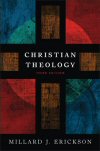
Christian Theology
- Author: Millard J. Erickson
- Edition: 3rd
- Publisher: Baker Academic
- Publication Date: 2013
- Pages: 1,280
Leading evangelical scholar Millard J. Erickson offers a new edition of his bestselling textbook, now substantially updated and revised throughout. This edition takes into account feedback from professors and students and reflects current theological conversations, with added material on the atonement, justification, and divine foreknowledge. Erickson's comprehensive introduction is biblical, contemporary, moderate, and fair to various positions, and it applies doctrine to Christian life and ministry.
The central theme of Christian Theology is the magnificence of God. The author refers to the greatness of God in terms of his power, knowledge, and other traditional "natural attributes," as well as his excellence and splendor. Erickson reminds us that "theology as well as life needs to be centered on the great living God, rather than on the human creature." Perceiving the Christian faith as being challenged by both religious competitors and nonreligious ideologies, Dr. Erickson insists that careful theological reasoning and affirmation is even more important than when his first edition was published. With that in mind, it is the author's hope and prayer that his book will be used by God to strengthen the church and extend the kingdom.
For many years I have known and honored Millard Erickson. What a consummate joy to see this third edition of his widely influential Christian Theology. The incomparable mix of a work of serious theological reflection yet such readability that a biblically literate layperson can grasp its message makes the volume special. It will be extensively used at Southwestern Baptist Theological Seminary.
—Paige Patterson, president, Southwestern Baptist Theological Seminary
This book is a very learned presentation of Christian doctrine on the basis of Scripture, but in continuing conversation with the tradition of the church as well as with modern philosophical and theological contributions. While affirming the divine inspiration and inerrancy of the Bible, its form of argument is not fundamentalist, but open and available to everyone interested in the issues of Christian doctrine. The author takes account of critical historical exegesis. His book constitutes an excellent example of the evangelical outlook on the Christian faith and a basis for dialogue with other theological positions.
—Wolfhart Pannenberg, emeritus professor of systematic theology, University of Munich
Millard Erickson's Christian Theology has established itself as the most widely used and most generally useful of modern Protestant surveys of Christian truth. Robustly evangelical, essentially conservative, thoroughly contemporary, firmly Baptist, gently Calvinistic, and cautiously post-tribulationist premillennial, its fair-minded breadth and meticulous analysis of options have won it consistent praise. Now updated, augmented, and provided with study aids, its usefulness as a text for students and a resource for pastors and lay leaders will be even greater. It is altogether a masterly piece of work.
—J.I. Packer, Board of Governors Professor of Theology, Regent College
Erickson has again given the church a clear-minded, well stated, comprehensive expression of evangelical orthodoxy that is thoroughly informed for ministry in the twenty-first century. We are surely in his debt.
—John D. Morrison, professor of theological studies, Liberty University and Liberty Baptist Theological Seminary
Millard Erickson's Christian Theology is irenic in tone while incisive in critique, readable in format while substantial in content, and always faithful to Scripture and to the service of God's church. The third edition will guide another generation through the ever-changing context in which theology must be done.
—Gerry Breshears, professor of theology, Western Seminary, Portland
This may well be the best systematic theology available.
—Southwestern Journal of Theology
Belongs in the personal library of every evangelical pastor, teacher, and student.
—Grace Theological Journal
Destined to be the major beginning text in systematic theology for evangelicals in the twenty-first century.
—Review and Expositor
This is a good place to look for a concise statement of varying theological positions from one who affirms the inerrancy of the Bible.
—New Horizons
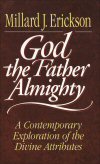
God the Father Almighty: A Contemporary Exploration of the Divine Attributes
- Author: Millard J. Erickson
- Publisher: Baker
- Publication Date: 2003
- Pages: 304
In God the Father Almighty, Erickson develops a sturdy exposition of the doctrine of God, beginning with an introductory discussion of the doctrine's importance. He then interacts extensively with criticisms brought against the traditional view of God by pluralism, process theology, and free will theism. After evaluating the positive and negative elements in each of these views, Erickson offers a fresh analysis of the attributes of God in light of Scripture and the contemporary scene. Erickson concludes that a proper understanding of God is foundational for both theology and Christian living.
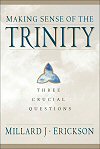
Making Sense of the Trinity: Three Crucial Questions
- Author: Millard J. Erickson
- Publisher: Baker Academic
- Publication Date: 2000
- Pages: 112
Sample Pages: 1 | 2 | 3 | 4 | 5 | 6 | 7
Despite the common use of the phrase Father, Son, and Holy Spirit, many Christians and plenty of nonbelievers lack an understanding of the doctrine of the Trinity. This is often a barrier to faith or growth—but one that can be overcome when explored openly and thoroughly. The Trinity has much to teach us about the essence of God and our relationships with one another.
In Making Sense of the Trinity, Millard J. Erickson demonstrates the biblical foundation, logic, and importance of the Trinity as he answers three questions:
- Is the doctrine of the Trinity biblical?
- Does the doctrine of the Trinity make sense?
- Does the doctrine of the Trinity make any difference?
Erickson's down-to-earth language speaks to laity, seminary students, pastors, and scholars alike. All four groups will appreciate the reliable guidance of this respected scholar.
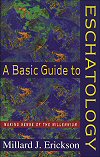
A Basic Guide to Eschatology: Making Sense of the Millennium
- Author: Millard J. Erickson
- Publisher: Baker
- Publication Date: 1999
- Pages: 200
Sample Pages: 1 | 2 | 3 | 4 | 5 | 6 | 7
At the turn of the millennium, when increasing attention was being given to eschatological subjects, there was a need for an objective, comprehensive overview of the various end-times perspectives. A Basic Guide to Eschatology provided just such a resource.
In this fair, careful, and accessible study, leading evangelical theologian Millard Erickson gives an overview of various end-times perspectives. Pastors, students, and all those interested in end-times thought will find A Basic Guide to Eschatology an understandable, well-organized examination of the various viewpoints.
Each of Erickson's position evaluations includes a brief overview, a history, a more thorough examination of its major concepts and of the arguments offered in support of them; and an evaluation of both its positive and negative aspects. This volume contains an updated chapter that discusses new developments in dispensationalism.
Erickson is certainly one of the most prolific writers among contemporary Baptists. But this comment about quantity shouldn't eclipse the high quality of Erickson's writing. He does a superb job at explaining topics that can be difficult to understand—in this case, eschatology. In a concise, to-the-point fashion, Erickson examines strengths and weaknesses of each of the major schools of thought.
—Minister's Packet
Lucid and well-organized. . . . Each chapter begins with an overview of the position, followed by a short history, and then a more detailed defense. A brief evaluation . . . concludes the discussion of each position.
—Christian Scholar's Review
Puts forth clearly and responsibly historically held post-, a-, and premillennial views. . . . A balanced and fair book.
—Reformed Review
Erickson is to be commended for the fair, balanced, and careful treatment he has given to each position.
—Eternity
Erickson has been fair in stating and evaluating the various views. . . . This book is a good place to begin in your quest for your own convictions.
—Southwestern Journal of Theology
Has value for all students of prophecy.
—Prairie Overcomer
Useful for understanding options that have been and remain important for a large number of Christian churches.
—DRIS Newsletter
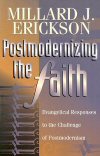
Postmodernizing the Faith
- Author: Millard J. Erickson
- Publisher: Baker
- Publication Date: 1998
- Pages: 163
Sample Pages: 1 | 2 | 3 | 4 | 5 | 6
Postmodernism—with its denial of objective knowledge and its deconstruction of language—has become a major topic of discussion in academic circles everywhere. How are evangelical thinkers responding to this new trend?
In Postmodernizing the Faith, respected theologian Millard Erickson explores six evangelical responses—both positive and negative—to postmodernism and offers his own reaction to the movement. Erickson's purpose is "to introduce readers to postmodernism, to sensitize them to the importance of the issues, and to show them some samples of differing evangelical responses."
Following an introductory chapter describing postmodernism, Erickson presents the responses of three evangelicals who consider the movement incompatible with orthodox Christianity. Next, he details the thought of three evangelicals who believe "postmodernism is a development that needs to be accepted, and Christian theology done in light of it, and incorporating at least some of it." In each chapter Erickson offers a judicious critique, highlighting both the strengths and weaknesses of the particular view being discussed.
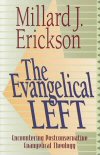
The Evangelical Left: Encountering Postconservative Evangelical Theology
- Author: Millard J. Erickson
- Publisher: Baker
- Publication Date: 1997
- Pages: 144
Millard Erickson identifies practitioners of a new theological movement in evangelicalism that who, he contends, have adopted a postconservative position and have drifted from the fundamental affirmations of conservative evangelicalism.
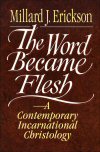
The Word Became Flesh: A Contemporary Incarnational Christology
- Author: Millard J. Erickson
- Publisher: Baker
- Publication Date: 1996
- Pages: 666
Sample Pages: 1 | 2 | 3 | 4 | 5 | 6
Respected author Millard J. Erickson offers a detailed, well-documented exploration of the person of Christ accessible to laypeople and stimulating for academics. After presenting the historical foundation upon which incarnational Christology stands, Erickson addresses modern theological approaches and formulates a contemporary understanding of Christology.
A massive compendium of information that will be valuable to anyone interested in contemporary theological trends. The review of contemporary Christologies in part 2, for instance, provides excellent summaries of numerous recent studies. Erickson is a master of identifying the central arguments and key representatives of theological movements. Readers will find here a lucid, readable summary of conservative Christology. Erickson's study will certainly become a standard textbook and resource in the field of Christology.
—Critical Review of Books in Religion
An admirable and much-appreciated attempt to speak to [the author's] contemporaries. The Word Became Flesh shows convincingly that an incarnational Christology of the traditional Chalcedonian type is possible and relevant today, and fits the biblical data better than any other.
—Andrews University Seminary Studies
Erickson has done the church great service in both highlighting the very range of challenges to incarnational Christology and in briefly setting out the issues at stake. I would commend this book not only as an excellent starting-point for anyone wishing to grapple with these vital issues but as an important contribution in its own right.
—The Evangelical Quarterly
Here is a well-informed, workmanlike overview of Christological discussion, ancient and modern, by an evangelical veteran.
—J.I. Packer, professor of theology, Regent College
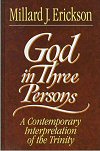
God in Three Persons: A Contemporary Interpretation of the Trinity
- Author: Millard J. Erickson
- Publisher: Baker
- Publication Date: 1995
- Pages: 356
The Trinity is the least understood and most important concept in the church. Yet many would just as soon jettison it in the interest of ecumenical unity. God in Three Persons defends the significance of a Trinitarian definition and explains it in understandable terms.
Source: https://www.logos.com/product/43191/millard-j-erickson-collection
Posted by: roycehosche012335.blogspot.com
Posting Komentar untuk "Millard Erickson Christian Theology Pdf Download"